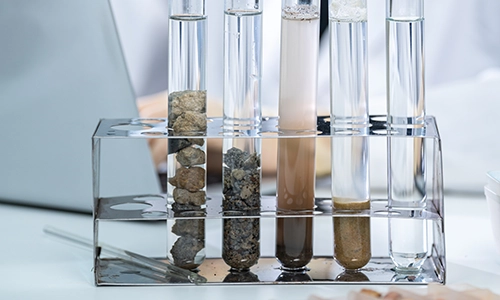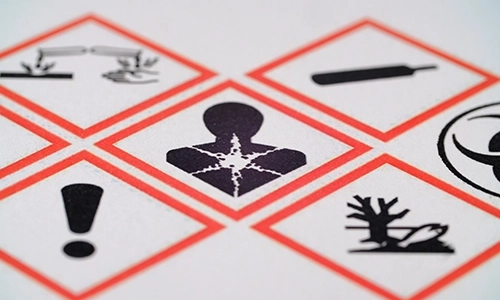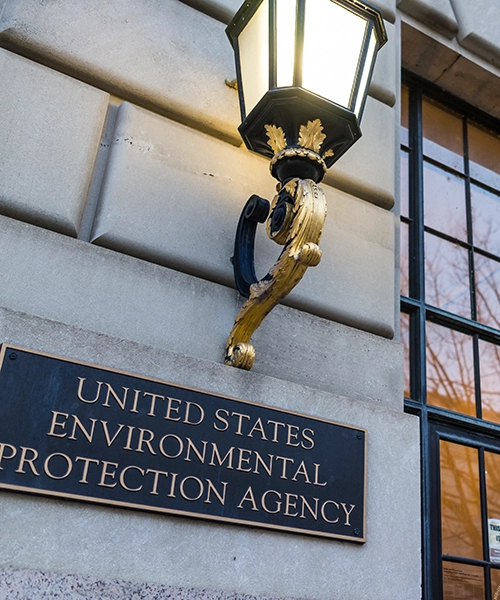Setting The Pace For Environmental Pesticide Testing
Pace® offers comprehensive environmental pesticide testing services to help our customers evaluate the potential impact of pesticides on water, groundwater, soil, biota, and certain types of waste. With a team of experienced professionals and a network of state-of-the-art testing laboratories, Pace® provides defensible results for regulatory compliance and in support of sustainable business practices across a wide range of industries that include:
- Environmental Consultants
- Environmental Engineers
- Municipalities
- Wastewater Industry
- Landfills
- Pesticide and Other Agricultural Chemical Manufacturing
- Private Well Testing

What Are Pesticides?
According to the Environmental Protection Agency (EPA), a pesticide is any substance or mixture of substances intended for preventing, destroying, repelling, or mitigating any pest. Pesticides keep crops and other vegetation free of pests that can impact human health and reduce crop yields. However, many pesticides can pose environmental and health problems when they enter the environment.
The EPA also includes herbicides under the definition of pesticides, and many of the regulatory requirements covering pesticide manufacturing, storage, use, and disposal also apply to herbicides. To provide our customers with the most relevant information and testing services, we created a solution page specific to herbicides. Visit Pace® Environmental Testing Services for Herbicides for more details.
What Impact Do Pesticides Have On The Environment?
Agricultural pesticide utilization is widespread throughout much of the world. The excessive use of these chemicals and their persistence in the environment have generated serious, lasting environmental contamination of soil, water, and, to a lesser extent, air. This contamination has had a negative impact on ecosystems and the food chain.


What Are The Dangers Of Pesticides To Human Health
Pesticides can cause both short-term and long-term adverse health effects. Short-term effects include stinging eyes, rashes, blisters, nausea, dizziness, and diarrhea. Long-term effects include cancers, birth defects, reproductive harm, immunotoxicity, neurological and developmental toxicity, and disruption of the endocrine system. The severity of the health risk depends on the toxicity and amount of exposure to the pesticide.
What Will A Pesticide Test Show?
There are many reasons to test for pesticides in soil, water, or consumer and commercial products. Testing can determine if the land is safe for building or growing crops or if remediation is necessary.

Pesticide Regulation
The EPA is responsible for regulating pesticides in the United States to protect human health and the environment. The EPA Office of Pesticide Programs handles most of the regulatory issues pertaining to pesticides. The EPA also enforces pesticide regulations and supports state and regional EPA programs to protect and certify pesticide applicators.

FIFRA governs the sale, distribution, use, and disposal of pesticides in the United States. All pesticides distributed or sold in the U.S. must be registered (licensed) by the EPA. Before the EPA registers a pesticide under FIFRA, the applicant must show, among other things, that using the pesticide according to specifications "will not generally cause unreasonable adverse effects on the environment.”
The Resource Conservation and Recovery Act (RCRA) is a proactive program that regulates municipal and hazardous waste disposal. Pesticide disposal is regulated under RCRA, which ensures responsible management of hazardous waste and non-hazardous solid waste.
Created in 1972 by the Clean Water Act (CWA), the National Pollutant Discharge Elimination System (NPDES) is a permitting program designed to control and manage the discharge of pollutants, such as pesticides, into waters of the United States and protect water quality and aquatic life. States can petition the EPA to administer their own NPDES program, and most states have received partial or full approval. Any discharge into a receiving body of water without a permit is considered unlawful.
Polychlorinated biphenyls (PCBs) were once used in a variety of industrial and commercial applications, including pesticide extenders. However, PCBs were banned from production and use in the United States by the Toxic Substances Control Act in 1976 and internationally by the Stockholm Convention on Persistent Organic Pollutants in 2001. This means that while PCBs were used in pesticides in the past, they are no longer legally used for this purpose in the US and many other countries.
Nevertheless, testing pesticide residue or stockpiles of older pesticides marked for disposal may be required to maintain compliance with the TSCA and other federal and state regulatory programs. For more on PCB testing and regulatory compliance, visit Pace® PCB Testing and Analysis.
Pesticides have the potential to contaminate drinking water supplies in both agricultural and urban settings. The Safe Drinking Water Act gives the EPA authority to administer several programs related to contaminants in drinking water. The SDWA also gives the EPA the authority to set National Primary Drinking Water Regulations (NPDWR) and enforce limits on contaminants in drinking water.
Pesticides have the potential to contaminate drinking water supplies in both agricultural and urban settings. The Safe Drinking Water Act gives the EPA authority to administer several programs related to contaminants in drinking water. The SDWA also gives the EPA the authority to set National Primary Drinking Water Regulations (NPDWR) and enforce limits on contaminants in drinking water.
Many states run pesticide disposal programs specifically for farmers and commercial pesticide users, often referred to as “Clean Sweep” programs. The details of the programs, including participants, materials collected, collection methods, and collection dates, vary by state. States may also set limits, but they may not exceed the EPA’s NPDWR limits.
Pace® Supports Your Environmental Project Needs
Pace® provides end-to-end support for a wide range of projects that call for pesticide testing, such as:
Large commercial operations may want to test their water influent and effluent for pesticide contamination as well as the soil around production facilities.
NPDES permits are used to monitor and manage the discharge of toxic pollutants in wastewater, and NPDES permitting may include pesticide testing requirements.
Stormwater runoff is another type of wastewater discharge that may be covered by NPDES permitting requirements.
Pesticides in well water can come from private septic systems, wastewater, flooded sewers, polluted stormwater runoff, fertilizers, agricultural runoff, and decaying plants. While the EPA rules that protect public drinking water systems do not apply to individual water systems, such as privately owned wells.
The Safe Drinking Water Act gives the EPA authority to regulate contaminants in drinking water, including pesticides. Many states have also set their own limits. Pace® is an EPA-approved lab for drinking water and credentialed in every state with a drinking water lab accreditation program.
Groundwater contamination from chemical dumpsites tends to attract the greatest public attention, but landfills, septic systems, and underground storage tanks can also be significant sources of pesticide contamination.
Pesticide identification is often required to develop a remedial plan. Pace® supports pesticide soil remediation with pesticide testing services.
The application of pesticides in or around homes, buildings, or farms is a common source of airborne contamination. The manufacture of pesticides and industrial spills, accidents, or releases from natural disasters can also release pesticides into the air. Once airborne, pesticides can contaminate surrounding communities, impacting soil, groundwater, surface water, and private drinking water wells.
Additional Resources
Need to find a lab that can handle your unique requirements?
Contact us directly or download our list of environmental certifications across our network.